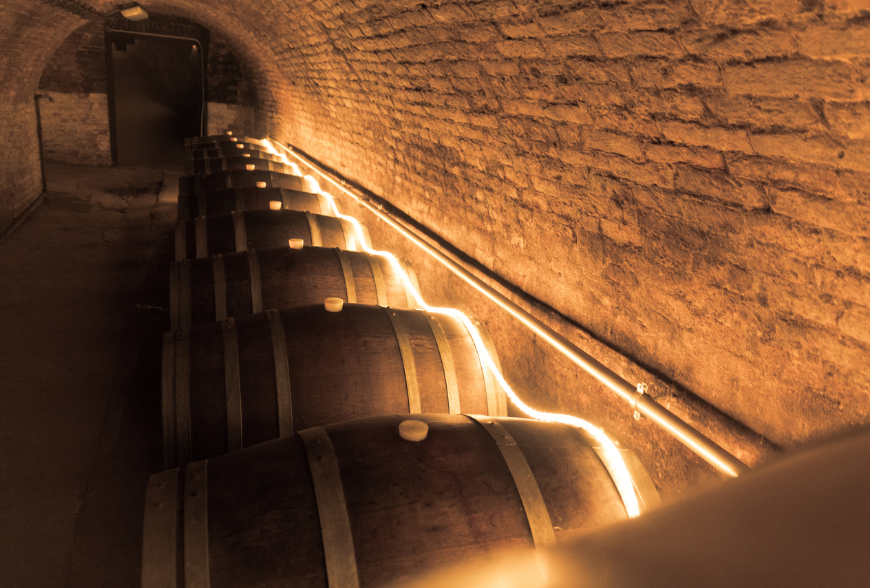Does wine always improve with age?

Wine, that noble, age-old beverage, has been awakening the senses and charming the palate for centuries. Time is one of its most mysterious allies, capable of transforming a simple grape juice into a tasty work of art. Yet it would be a mistake to think that all wines improve over time, as their development depends on many factors that make them so unique.
As soon as a wine is born, its destiny begins to take shape. Different grape varieties, terroirs and winemaking techniques will give rise to wines with unique characteristics. Some wines, by their very nature, are meant to be enjoyed young, with all their freshness and bright fruitiness. Sparkling wines, light whites or seductive rosés, for example, rarely benefit from ageing. Their charm lies in their liveliness, effervescence and lightness, which can disappear over time.
Other wines, however, have a powerful tannic structure and aromatic complexity that call for prolonged cellaring. Red wines for laying down, made from grape varieties such as Cabernet Sauvignon, Merlot, Nebbiolo or Syrah, are perfect examples. Their robust tannins may seem austere when young, but over time they melt and soften, lending a velvety texture and fascinating depth. The aromas undergo a metamorphosis, evolving from notes of fresh fruit to more complex aromas of leather, undergrowth, even tobacco or truffles.
The vintage also plays a crucial role in the wine's development. Every year, climatic conditions vary, and the grapes harvested reflect these nuances. A hot, dry vintage can produce richer, more opulent wines, while a cool, rainy vintage will produce more elegant, delicate wines. Great vintages, characterised by ideal weather conditions, can produce exceptional wines that deserve to be kept for decades. On the other hand, more modest vintages are generally destined for earlier consumption.
Vinification is also a determining factor. Wines made for quick consumption will be vinified in such a way as to preserve their freshness and primary aromas, while wines intended for ageing in the cellar will often undergo longer fermentations and ageing in oak barrels, in order to acquire the complexity needed to improve over time.
Once the wine is bottled, it enters a new phase in its life, determined by the storage conditions. A suitable cellar is essential to allow the wine to age optimally. The temperature must be constant, ideally between 12°C and 16°C, to avoid any thermal shock that could alter the quality of the wine. Humidity must be maintained at an appropriate level, generally around 70%, to preserve the corks and labels. The cellar must be protected from light, especially UV rays, which can alter the components of the wine. Finally, the bottles must be stored horizontally so that the wine is in contact with the cork, keeping it sealed and preventing premature oxidation.
So it's clear that ageing wine is a complex process that depends on many factors. Each wine is unique, and there is no universal rule for determining whether a wine will improve with age. This is where some of the magic of wine lies, because each tasting is a discovery, a sensory adventure that evolves with time and the experience of each individual.
For lovers of wines for laying down, the excitement lies in waiting and tasting wines at different stages of their development. Patience is an essential virtue for those wishing to explore a wine's ageing potential. Some wines will reach their peak after a few years, while others will take decades to reveal their full potential.
It's important to remember that not everyone enjoys aged wines. Aged wines may have more complex aromas and flavours, but they may also lose their freshness and fruitiness, which may displease some tasters. Personal preferences play a major role in the enjoyment of a wine, and there is no absolute truth when it comes to taste.
When planning to keep wines for a long time, it's a good idea to consult the producer's recommendations and the opinions of wine experts. Buying guides and critics often offer tasting notes at different stages in the wine's development, which can be very useful for getting an idea of a specific wine's ageing potential.
For those who don't want to wait years to enjoy a good wine, there are many alternatives. Many winemakers are now offering ready-to-drink wines, made in a modern, accessible style, which offer an explosion of fruit and freshness from their youth.
In short, wine does not always improve with age, but its ability to age positively is one of the great magics of this age-old art. Wines for laying down are an invitation to travel through time, discovering new facets of taste, while ready-to-drink wines offer the immediate pleasure of tasting.

 The Importance of Glass in Wine Tasting
The Importance of Glass in Wine Tasting
 Investing in Wine: A Resilient Asset in 2024
Investing in Wine: A Resilient Asset in 2024
 Wine Cellar: Understanding the Different Storage Zones for Optimal Preservation
Wine Cellar: Understanding the Different Storage Zones for Optimal Preservation
 La Sommelière’s Tips for Building Your First Wine Cellar
La Sommelière’s Tips for Building Your First Wine Cellar
 How to Open an Old Vintage?
How to Open an Old Vintage?